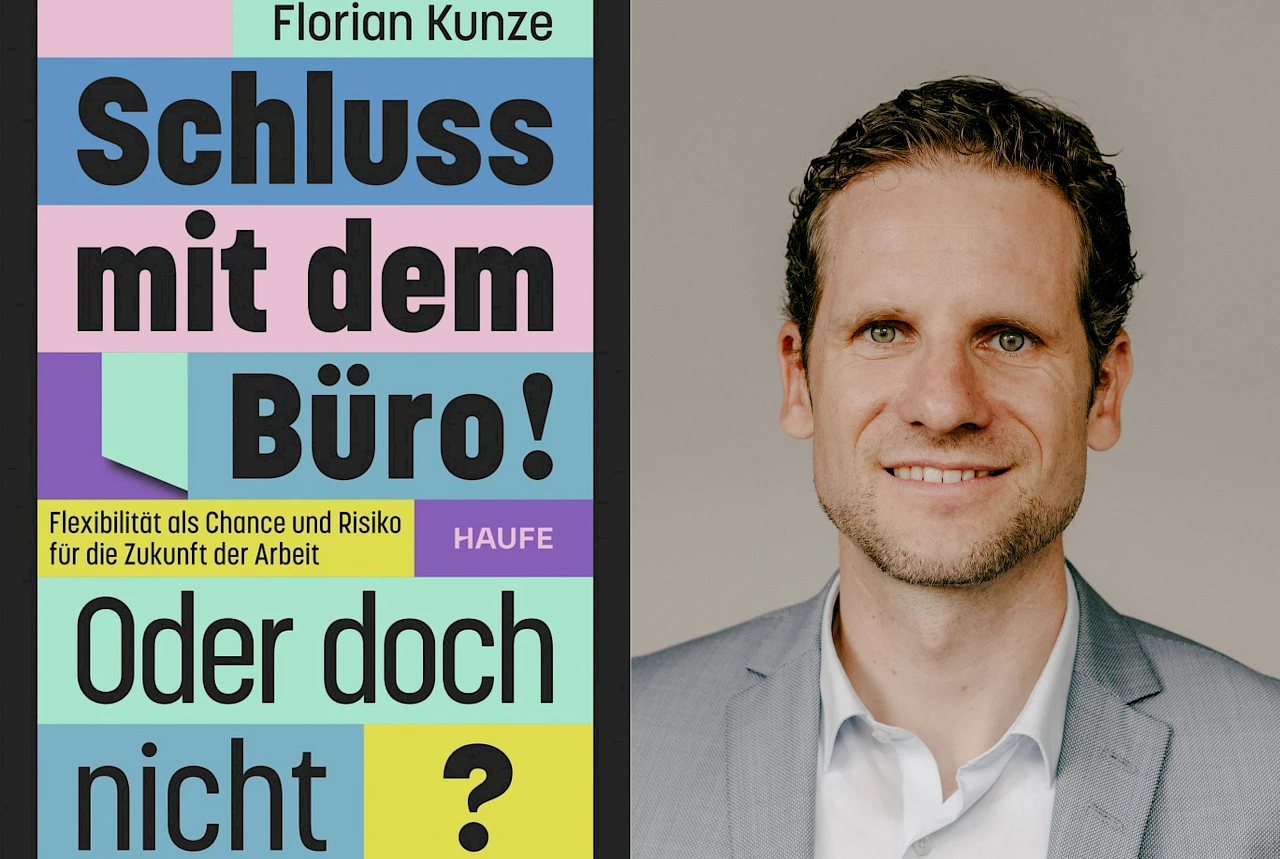How can New Work succeed beyond buzzwords? In an interview with the IBA Forum, Prof. Dr Florian Kunze, director of the Future of Work Lab at the University of Konstanz, explains the developments currently shaping the world of work, why offices remain important as social infrastructure, and why trust is more important than technology today.
Professor Kunze, you head up the Future of Work Lab in Konstanz. What are you researching?
We examine how major social and technological developments are received within organizations. Demographic changes, digitalization, changing values—all of these ultimately take place within teams and leadership relationships. We are interested in how these dynamics affect productivity, health, and collaboration. In addition to international research, we are particularly interested in the exchange with practitioners.
Which dynamics are having the greatest impact on change?
Three factors are currently interacting particularly strongly: First, the demographic-driven shortage of skilled workers. Secondly, the flexibilization of working hours and locations that has become established since the pandemic. And thirdly, the rapid integration of artificial intelligence. This combination creates tensions: on the one hand, companies need to retain their talent, while on the other hand, they need to reinvent themselves technologically. This requires more subtle control than rigid guidelines from above.
Many companies are currently discussing mandatory returns to the office. What do your studies show?
The either/or debate falls short. Productivity depends less on location than on the quality of team coordination. There are situations in which physical proximity facilitates creative processes and onboarding, and others in which concentrated, location-independent work leads to performance gains. Successful teams make their decisions together instead of being centrally controlled. A transparent decision-making process strengthens acceptance far more than compulsory attendance.
What is the significance of the office in a hybrid working world?
Offices are not only places where work is done, but also places of social infrastructure. They are where trust, informal exchanges, and learning opportunities arise. This can only be reproduced to a limited extent digitally. Well-designed offices, on the other hand, make it possible. Presence regains significance when it serves a clear purpose. This also includes designing spaces in such a way that they facilitate encounters rather than simply providing space.
Flexible working also changes physical and mental well-being. Where are the risks?
Studies show that people who work from home move less on average. Added to this are ergonomic deficits, as the kitchen table rarely replaces a professional workplace. Companies should therefore provide their employees with greater support, for example with clear guidelines, subsidies or loan models for home office equipment, as well as regular health check-ups for the team. This is not about control, but about maintaining performance and resilience in the long term.
How do you lead your own team?
We work with a high degree of personal responsibility. One fixed day per week when everyone is present creates structure, but otherwise the rule is: work where you are most effective. For me, leadership means orchestrating rather than directing. That means providing guidance, establishing a rhythm for communication, and documenting decisions. This creates reliability and trust, even without constant presence.
Please also read

Let’s take a look at the role of AI. Disruption or hype?
The disruption is real, but it’s not new. Historically, labor markets have always demonstrated a high degree of adaptability. The difference this time is the speed. AI can take over routines, but it should empower people. In teams that use AI wisely together, we see higher quality decisions and greater efficiency. The key lies in training: employees must be able to understand the technology, question it, and help shape it.
What specific action items do you see for companies?
Organizations should manage hybrid work in a differentiated way and plan presence not dogmatically, but based on task logic. Offices should be designed as places of interaction where there are clear opportunities for exchange and learning. Second, health and ergonomics need fixed structures, from exercise breaks to counseling services. Managers must learn to support hybrid teams, for example through regular reviews and feedback formats. Finally, AI skills should be systematically developed – from basic training to practical playbooks. It is important to understand learning as part of everyday work and not as an additional burden.
How is flexibility changing cities and how we live together?
We are seeing significant decentralization: while city centers are losing foot traffic, suburbs and residential areas are gaining in importance. This has an impact on urban planning, mobility, and social routines. At the same time, the risk of social isolation is increasing, especially among young people. Companies are therefore also places of social participation. Real encounters and communal spaces are crucial for fostering bonds and maintaining mental health.
What is your conclusion after almost ten years of research into the future of work?
Technology changes structures, trust shapes culture. The future of work will be successful where technological innovation meets human connection. Leadership that conveys meaning, offers psychological security, and opens up spaces for learning will become a decisive competitive factor. To achieve this, we need less ideology and more evidence, as well as the courage to actively shape hybrid collaboration. In my new book, I bridge the gap between research and practice, bring together key studies, and present concrete routines for everyday working life.
Thank you for talking with us, Professor Kunze.





